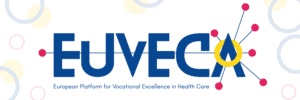Challenge
The sustainability of the European health care sector is challenged by 6 mega trends, namely:

EUVECA aims to address six megatrends, one being the ageing population. The ageing population brings forth a range of considerations, and it is crucial to promptly address them to foster effective resolutions and gain insights into the underlying reasons and the significance of considering this matter. In this article, we explore the connection between our project and the ageing population, emphasising the importance of upskilling and its role in addressing these challenges seamlessly.
The proportion of the global population aged 60 and above is projected to rise in almost every country worldwide between 2015 and 2080. As a result, population ageing is expected to have a negative impact on both workforce participation and savings rates, raising concerns about potential future economic growth slowdowns (1). According to the WHO, the number of people aged 60 years and older outnumbered children younger than 5 years in 2020. At an older age, individuals commonly encounter various conditions simultaneously, including hearing loss, cataracts, refractive errors, back and neck pain, osteoarthritis, chronic obstructive pulmonary disease, diabetes, depression, and dementia. The likelihood of experiencing multiple conditions concurrently increases with older age (2). Further, the survival rates for cancer continue to improve, and therefore, effective management of comorbid conditions becomes increasingly vital. Simultaneously, it remains imperative for general physicians to possess comprehensive knowledge of prevalent cardiovascular conditions like heart failure and hypertension (3). Nowadays, an increasing number of individuals are being impacted by chronic illnesses like diabetes and cardiovascular diseases. The ageing population and lifestyle choices are recognised factors contributing to this phenomenon. Consequently, individuals require care for a substantial duration of their lives.
As the population ages, the demand from older people increases, requiring more and often increasingly complex healthcare services, while the number of people in the workforce decreases. As a result, there will be fewer staff and less public funding to meet the need and demand for high-quality care. EUVECA has recognised the significance of educating and educating healthcare professionals on 21st-century skills so that they can effectively address the challenges presented by a rapidly growing, ageing population. In the future, it will be crucial for patients with chronic diseases and comorbidities to be more actively engaged, take responsibility, self-monitor and continuously communicate with healthcare professionals.
EUVECA is well aware of this mega trend and our objective is to support the necessary innovation and development of the healthcare sector by ensuring the provision of future-oriented skills within the sector. The greying population in the EU is only one of the future megatrends to which the project pays great attention.
Sources
(1) Economics Aspects of Ageing Population: Economics Aspects of Ageing Population – ScienceDirect
(2) WHO: Ageing and health
(3) The ageing population in healthcare: a challenge to, and in, the workforce: The ageing population in healthcare: a challenge to, and in, the workforce – PMC

Chronic diseases are long-term conditions that typically progress slowly, such as cardiovascular diseases, diabetes, cancer, and respiratory illnesses. These diseases are characterised by their persistence, often requiring lifelong management and care. The occurrence of comorbidities—multiple chronic conditions affecting a single patient—further complicates care, demanding tailored approaches that address interconnected health challenges. With ageing populations and lifestyle factors like sedentary habits and unhealthy diets on the rise, the prevalence of chronic diseases and comorbidities is expected to increase dramatically (1). This trend necessitates a comprehensive understanding and innovative responses from healthcare providers to ensure effective long-term patient care.
Preventing chronic diseases relies on a multifaceted approach that includes promoting healthier lifestyles, regular screenings, and early interventions. Encouraging physical activity, balanced nutrition, and tobacco cessation are critical measures to reduce risk factors for conditions such as diabetes, heart disease, and cancer. Additionally, preventive healthcare strategies like routine check-ups and vaccinations can mitigate the development of these illnesses. Public health policies that promote awareness and access to preventive services play a crucial role in lowering the incidence of chronic diseases and reducing the burden on healthcare systems (2). Educating healthcare professionals in preventive strategies and patient engagement is vital, aligning with the goals of the EUVECA project to upskill professionals for future healthcare challenges.
Looking ahead, the increasing prevalence of chronic diseases and comorbidities will place significant demands on healthcare systems. The ageing population and ongoing lifestyle challenges will drive the need for more integrated and personalised care solutions. Innovative approaches, such as digital health tools, telemedicine, and patient-cantered care, will be essential in addressing these challenges (3). The EUVECA project is dedicated to preparing healthcare professionals for these future demands by fostering vocational excellence, encouraging mobility, and supporting interregional collaboration. By investing in the development of future-oriented skills, EUVECA aims to ensure that healthcare professionals are equipped to manage the complexities of chronic disease care and contribute to sustainable, high-quality healthcare systems.
Sources
(1) World Health Organization. Noncommunicable diseases: Key facts [Internet]. Geneva: World Health Organization; 2023 [cited 2024 Dec 9]. Available from: https://www.who.int/news-room/fact-sheets/detail/noncommunicable-diseases
(2) GBD 2019 Risk Factors Collaborators. Global burden of 87 risk factors in 204 countries and territories, 1990–2019: a systematic analysis for the Global Burden of Disease Study 2019. Lancet. 2020 Oct 17;396(10258):1223–49.
(3) Barnett K, Mercer SW, Norbury M, Watt G, Wyke S, Guthrie B. Epidemiology of multimorbidity and implications for health care, research, and medical education: a cross-sectional study. Lancet. 2012 Jul 7;380(9836):37–43.

The rapid digitalisation of society, driven by the information technology revolution, is reshaping modern healthcare. The widespread adoption of technologies such as artificial intelligence (AI), big data, wearable devices and mobile health applications is transforming the way healthcare professionals deliver care and manage patient outcomes. However, these advances also require new skills to navigate the evolving digital landscape. EUVECA is supporting innovation in the health sector by promoting future-ready skills through Regional Vocational Excellence Hubs (RVEHs). These hubs work to create a coordinated, innovative and collaborative health education ecosystem across Europe.
A critical issue is the rise of AI in healthcare, which requires professionals to understand its diverse applications, from diagnostic imaging to predictive analytics, as well as its limitations. As AI becomes an integral part of care delivery, a paradigm shift in relevant skills for healthcare professionals is needed (1). New relevant skills can range from basic technical skills to navigate AI platforms, to data literacy, to interpreting AI output (1). In addition, healthcare providers need to prioritise data security and privacy, as the sensitivity of health data requires strict adherence to legal and ethical guidelines (2). EUVECA facilitates inter-regional learning to equip health professionals with knowledge on secure data handling and the ethical implications of technology use.
Another pressing issue is the digital divide, which threatens equitable access to technology-enhanced care and exacerbates poorer health outcomes for certain populations (3). Variations in digital literacy, economic resources and geographic connectivity highlight the need for universal design and alternative solutions for underserved populations (2). In addition, health professionals have a key role to play in guiding patients through the overwhelming amount of health information available online and distinguishing credible sources from misinformation. EUVECA’s commitment to providing 21st century skills ensures that health professionals can meet these challenges, contributing to upward convergence and innovation in health education.
Sources
(1) Ibrahim T, Rashad H. The evolving role of healthcare professionals in the age of ai: impacts on employment, skill requirements, and professional development. Journal of Artificial Intelligence and Machine Learning in Management. 2024 Feb 9;8(2):14-21.
(2) European Commission. Communication on enabling the digital transformation of health and care in the digital single market. Brussels: European Commission; 2018. Available from: https://eur-lex.europa.eu/legal-content/EN/TXT/?uri=CELEX%3A52018DC0233
(3) Saeed SA, Masters RM. Disparities in health care and the digital divide. Current psychiatry reports. 2021 Sep;23:1-6.

Personalised medicine is a medical model that tailors prevention and treatment strategies to the individual characteristics of each patient. It involves the characterisation of an individual’s phenotype and genotype, such as molecular profiling, medical imaging and lifestyle data, to ensure that the right therapeutic strategy is applied to the right person at the right time (1). This trend holds great promise for improving patient outcomes, but it also brings with it a significant need for healthcare professionals upskilling. EUVECA recognises the importance of equipping healthcare professionals with the forward-thinking skills to effectively manage this change.
One of the key areas of change is the demand for genomic and data analysis skills. Personalised medicine relies heavily on interpreting genetic information and analysing large data sets to inform decisions about disease prevention, diagnosis and treatment. This requires healthcare professionals to develop expertise in genomics, bioinformatics and advanced analytical tools. In addition, the multidisciplinary nature of personalised medicine requires strong collaboration and communication skills to enable professionals from different disciplines to work together seamlessly. The EUVECA project prioritises such interdisciplinary learning through its Regional Vocational Excellence Hubs (RVEHs), fostering a culture of innovation and collaboration across European health education ecosystems.
Ethical considerations and patient-centred care are equally important in the era of personalised medicine (2). As healthcare becomes more personalised, professionals will need to address privacy concerns around genetic data and engage patients in shared decision making (3). This requires robust ethical training and improved empathy and communication skills among healthcare professionals. EUVECA supports lifelong learning initiatives to ensure that healthcare professionals remain equipped to meet these challenges effectively. By aligning skills development with the demands of the 21st century, EUVECA is paving the way for a healthcare workforce ready to embrace the complexities and benefits of personalised medicine.
Sources
(1) European Commission. Personalised Medicine [Internet]. [cited 2024 Dec 13]. Available from: https://health.ec.europa.eu/medicinal-products/personalised-medicine_en
(2) Feiler T, Gaitskell K, Maughan T, Hordern J. Personalised medicine: the promise, the hype and the pitfalls. The New Bioethics. 2017 Jan 2;23(1):1-2.
(3) Mathur S, Sutton J. Personalized medicine could transform healthcare. Biotechnol Adv. 2017;34(7):1373-80.

The unlimited availability of health information empowers many consumers and patients to take greater responsibility for their care, aligning with professionals’ goals to enhance patient involvement. Driven by cost-saving pressures, this trend promotes efficient use of technological healthcare resources (1). It emphasises the necessity for healthcare professionals to develop and enhance their abilities into relevant 21st-century skills, such as adaptability, proficiency in using digital tools, analytical thinking, and proficient communication skills, to continue to successfully navigate and make valuable contributions to a changing healthcare sector. EUVECA acknowledges the importance of equipping the healthcare task force with these skills.
Key characteristics of the Modern Health Consumer are their proactive and knowledgeable attitude towards health and healthcare, and the utilisation of novel technology, such as e-health applications and wearable devices, enabling them to make well-informed and proactive choices on their well-being (1). The Modern Health Consumer is faced with an abundance of health information, which can be both a great resource and overwhelming. Healthcare professionals therefore need to be a reliable source to support the navigation of an information overflow, through an emphasis on providing patients with relevant (e-)health literacy skills (2).
This megatrend is essential for the establishment of a sustainable healthcare industry due to various reasons. By fostering individual engagement in their health, it advocates for preventive actions and timely intervention, hence alleviating the strain on healthcare systems. This is of particular importance especially regarding the aging population which foresees a much higher strain in the near future. The EUVECA project plays a pivotal role in preparing healthcare professionals for the evolving demands of modern health consumers. By promoting the development of essential 21st-century skills, EUVECA ensures that healthcare providers are equipped to guide patients through a landscape increasingly defined by digital tools and self-management.
Sources
(1) Eysenbach G, Diepgen TL. The role of e-health and consumer health informatics for evidence-based patient choice in the 21st century. Clinics in dermatology. 2001 Jan 1;19(1):11-7.
(2) Norman CD, Skinner HA. eHealth literacy: essential skills for consumer health in a networked world. Journal of medical Internet research. 2006 Jun 16;8(2):e506.

The climate challenge is critical in health and social care. Being responsible for about 5% of all greenhouse gas emissions globally, the healthcare sector has great potential to reduce global warming through green interventions which can be introduced by care providers (1). A sustainable healthcare sector includes considerations of the environmental footprint of the individual healthcare provider. Everyone involved within the healthcare sector has an important role to play in identifying opportunities to create a healthcare sector that limits the use of energy, water, chemicals, and plastics. Additionally, health systems need to adapt to and anticipate a changing climate including extreme weather events and climate stress to remain functional during crisis situations (2).
Various skills are needed within the health and care workforce to address this critical megatrend. Green skills – which can be defined as the competencies needed to address environmental challenges and promote sustainability, including areas like renewable energy and waste management (3) – are of particular importance. These skills are increasingly valuable across industries, including health and social sectors. Relevant green skills include knowledge and analytical skills, collaboration and communication skills, as well as clinical practice skills related to the climate challenge. More specifically these skills refer to the foundational knowledge to understand the dynamics governing the effects of climate on health, and expanded interdisciplinary cooperation and collaboration coupled with effective communication to a wide variety of stakeholders. Lastly, they include the promotion of health care facility resilience, preparedness for emergencies and the application of day-to-day practical knowledge in adjusting medications and reducing patient vulnerabilities to climate impacts.
EUVECA strongly supports the development of green skills among healthcare providers. This strategic approach ensures that healthcare professionals are equipped to implement sustainable practices, improve resilience, and reduce the sector’s environmental footprint. EUVECA’s collaborative framework, which unites regional stakeholders across Europe, exemplifies the coordinated effort needed to create a healthcare sector that is not only adaptive to climate change but also actively contributes to mitigating its impacts.
Sources
(1) Or Z, Seppänen AV. The role of the health sector in tackling climate change: A narrative review. Health Policy. 2024 Mar 20:105053.
(2) World Health Organisation. Strengthening climate-resilient and environmentally friendly health systems and services [Internet]. Geneva: WHO; [cited 2024 Dec 18]. Available from: https://www.who.int/europe/activities/strengthening-climate-resilient-and-environmentally-friendly-health-systems-and-services
(3) EUVECA. Baseline Report [Internet]. Brussels: EUVECA; 2023 [cited 2024 Dec 18]. Available from: https://euveca.eu/wp-content/uploads/2023/12/EUVECA-Baseline-Report-D1.pdf

